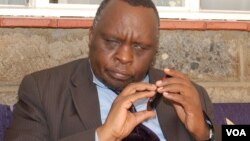More than a billion people in the world are disabled. That is about 15 percent of the world population. A million of them live in Kenya and many of them – children included - live in rural areas. According to the United Nations, more than one billion people – about 15 percent of the world’s population – live with some form of disability. Compared to the rest of the world, these Kenyans not only have to manage their disabilities, they mange them under conditions of poorer health, lower education levels, fewer economic opportunities and higher rates of poverty.
But a new campaign led by a Nairobi-based global advocacy program of the World Council of Churches aims to integrate persons with disabilities in development activities.
The Ecumenical Disability Advocates Network (EDAN) recently voted to extend its efforts to encourage the training and hiring of the disabled to all parts of East Africa. They seek to include the disabled in the development process. For the next two years, the network will run a series of forums and other activities in Kenya, Uganda and Tanzania bout how to accomplish that.
“The main thing with this inclusive programme is to convince development planners that people with disabilities can be part of the mainstream activities,” says Dr. Samuel Kabue, the group’s executive director.
Include the disabled in daily life
He says if the people with disabilities are made part of the mainstream development process you set an example for others as a role model.
“That’s one way we feel inclusion will achieve,” he says.
Albinos consider themselves among the disabled because society considers them to be physically challenged by their lack of skin pigmentation. They are certainly treated with extreme prejudice in many regions. Tanzania’s albinos suffer extreme abuse and even murder. They are abducted and killed for their body parts for traditional magic rituals, allegedly to bring good fortune or success.
Kabue says experts believe that including persons with disabilities in development helps eliminate barriers and enables such persons to contribute effectively to the community.
“Even in education,” says Kabue, who is visually impaired. “And if you are blind and you go to the same high school with other people who are not blind, they grow up knowing that you are a student like any other,” says Dr. Kabue.
“You go to the university, you study with people who go out looking for jobs like you and when you get a job, people know you went through the same system. This is the biggest value of inclusion,” he said.
Pay attention to the constitution
Dr. Kabue appeals to local leaders to be mindful of the welfare of the physically-challenged by providing them with equal opportunities and rights to access in accordance with the constitution. He cites examples where such persons have played exemplary roles.
“We have seen people with visual impairment going into teaching and law in this country,” Kabue says. “We have some people who are physically disabled, say somebody is in a wheelchair; there is no reason why he cannot be an accountant, an administrator or a chief officer of a company.
“Quite often people will ask, ‘How will you make it if you are on a wheelchair?’
“We are saying one of the provisions of our Disability Act as well as the constitution itself and the Convention on the Rights of Persons with Disabilities is the right to access.”
He says the situation can also be changed by altering the way society, and employers, view the disabled.
“Attitude is one of the biggest problems that we are facing,” says Dr. Kabue. “Of course, when we talk of attitude that leads to discrimination – you are simply counted out of either positions that need certain qualifications and so you don’t have the experience where experience is needed. So the root is attitude. Attitude leads to abuse of your rights through discrimination.”
Kabue wants the disabled integrated into all development efforts funded by the government and by NGO’s, rather than being limited to projects developed only for themselves.
Advocates for the disabled say that effort will require an accurate tally of the disabled in each community.
The government has a big role
“We call upon the government to streamline and speed up the registration of persons with disabilities,” says Alice Munala is a program coordinator of the Methodist Church in Kenya. She says there is need for “the government and other stakeholders to review the current statistics of persons with disabilities in Kenya to help in planning and decision making.”
Kenya’s churches have long been involved in rights of people who are physically challenged. They were instrumental in helping to get the views of the disabled into the 2010 constitution. That document says the government has adopted a number of laws and policies protecting people with disabilities, including their right to productive and decent work, and basic services including public transport.
Churches also involved in efforts to develop rural areas, including agricultural and livestock farming activities, schools and the provision of healthcare services. In that role, religious institutions have been instrumental in helping to find work for many people with disabilities.





